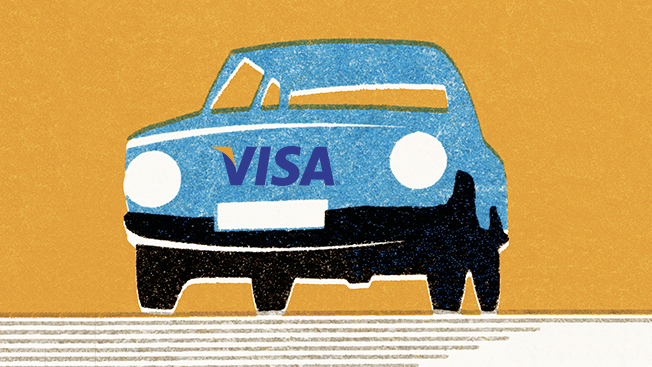BARCELONA, Spain—For Visa, mobile payments are old news. Nowadays, the brand has its eye on tying the Internet of Things to payments—starting with the connected car. While not yet a reality, Visa is showing off a prototype of a connected car app built with Honda at Mobile World Congress this week.
"It's illustrative of where the Internet of Things is going," Visa's svp of digital solutions, Sam Shrauger, told Adweek. "Our belief is that anything that's going to have connectivity at some point in the future is probably going to be a vehicle by which people conduct transactions."
The app is part of the car's dashboard and alerts consumers when their gas tank is low. Once someone pulls into a gas station, the app will determine how much gas the car needs, letting the person pay from inside the vehicle. Bluetooth technology triggers the payment from inside the car to the gas pump.
Each car stores a number called a token that is tied to a bank account. Unlike credit card numbers that scammers can easily rip off, tokens can't be used to buy anything outside of the car.
People will also be able to prepay based on the grade of gasoline they want, and purchase food and drinks from inside the station. Gas chain franchises, for instance, could then push specific discounts like a coupon for coffee to the person based on their purchase behavior.
In another example, Visa's car app helps drivers pay for parking while inside the car by calculating how much a spot costs.
The connected car app will be piloted this spring, but don't expect to see Visa-powered cars roaming the streets en masse anytime soon.
"If you look at what has to come together, the pumps have to be enabled, the vehicles need to be enabled, and there needs to be some form of standard protocol for all of that," Shrauger said. "That's what the payment and automobile industry are working through right now, but like any prototype, that's the way that we can find our way into the right long-term solution."
Techy cars are only a small part of Visa's bigger Internet of Things program, which also includes equipping jewelry, clothing and appliances with payment and security technology.
"Just as our watches have become connected and our appliances have become connected, cars probably will be as well," Shrauger added.








